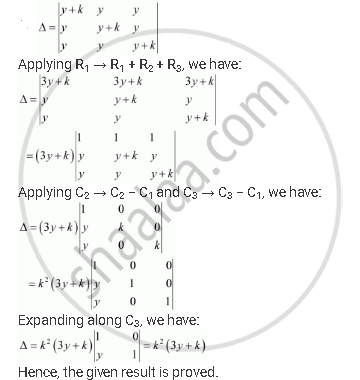Advertisements
Advertisements
प्रश्न
By using properties of determinants, show that:
`|(y+k,y, y),(y, y+k, y),(y, y, y+k)| = k^2(3y + k)`
उत्तर

APPEARS IN
संबंधित प्रश्न
Using properties of determinants, prove that `|[2y,y-z-x,2y],[2z,2z,z-x-y],[x-y-z,2x,2x]|=(x+y+z)^3`
Using the properties of determinants, prove the following:
`|[1,x,x+1],[2x,x(x-1),x(x+1)],[3x(1-x),x(x-1)(x-2),x(x+1)(x-1)]|=6x^2(1-x^2)`
Using properties of determinants, prove that
`|((x+y)^2,zx,zy),(zx,(z+y)^2,xy),(zy,xy,(z+x)^2)|=2xyz(x+y+z)^3`
By using properties of determinants, show that:
`|(1,1,1),(a,b,c),(a^3, b^3,c^3)|` = (a-b)(b-c)(c-a)(a+b+c)
Using properties of determinants, prove that:
`|(3a, -a+b, -a+c),(-b+a, 3b, -b+c),(-c+a, -c+b, 3c)|`= 3(a + b + c) (ab + bc + ca)
Using properties of determinants, prove that
`|(sin alpha, cos alpha, cos(alpha+ delta)),(sin beta, cos beta, cos (beta + delta)),(sin gamma, cos gamma, cos (gamma+ delta))| = 0`
Using properties of determinants, prove that
`|(a^2 + 2a,2a + 1,1),(2a+1,a+2, 1),(3, 3, 1)| = (a - 1)^3`
Using properties of determinants, prove that `|(x,x+y,x+2y),(x+2y, x,x+y),(x+y, x+2y, x)| = 9y^2(x + y)`
Using properties of determinants, prove that `|(1,1,1+3x),(1+3y, 1,1),(1,1+3z,1)| = 9(3xyz + xy + yz+ zx)`
Using properties of determinants show that
`[[1,1,1+x],[1,1+y,1],[1+z,1,1]] = xyz+ yz +zx+xy.`
Using properties of determinants, prove that
`|[b+c , a ,a ] ,[ b , a+c, b ] ,[c , c, a+b ]|` = 4abc
Without expanding the determinants, show that `|(l, "m", "n"),("e", "d", "f"),("u", "v", "w")| = |("n", "f", "w"),(l, "e", "u"),("m", "d", "v")|`
Using properties of determinant show that
`|("a" + "b", "a", "b"),("a", "a" + "c", "c"),("b", "c", "b" + "c")|` = 4abc
Using properties of determinant show that
`|(1, log_x y, log_x z),(log_y x, 1, log_y z),(log_z x, log_z y, 1)|` = 0
If `|(4 + x, 4 - x, 4 - x),(4 - x,4 + x,4 - x),(4 - x,4 - x, 4 + x)|` = 0, then find the values of x.
Select the correct option from the given alternatives:
Let D = `|(sintheta*cosphi, sintheta*sinphi, costheta),(costheta*cosphi, costheta*sinphi, -sintheta),(-sintheta*sinphi, sintheta*cosphi, 0)|` then
Select the correct option from the given alternatives:
`|("b" + "c", "c" + "a", "a" + "b"),("q" + "r", "r" + "p", "p" + "q"),(y + z, z + x, x + y)|` =
Select the correct option from the given alternatives:
The system 3x – y + 4z = 3, x + 2y – 3z = –2 and 6x + 5y + λz = –3 has at least one Solution when
Answer the following question:
Without expanding determinant show that
`|("b" + "c", "bc", "b"^2"c"^2),("c" + "a", "ca", "c"^2"a"^2),("a" + "b", "ab", "a"^2"b"^2)|` = 0
The value of `|(1, 1, 1),(""^"n""C"_1, ""^("n" + 2)"C"_1, ""^("n" + 4)"C"_1),(""^"n""C"_2, ""^("n" + 2)"C"_2, ""^("n" + 4)"C"_2)|` is 8.
Prove that: `|(y + z, z, y),(z, z + x, x),(y, x, x + y)|` = 4xyz
Find the value of θ satisfying `[(1, 1, sin3theta),(-4, 3, cos2theta),(7, -7, -2)]` = 0
The value of determinant `|("a" - "b", "b" + "c", "a"),("b" - "a", "c" + "a", "b"),("c" - "a", "a" + "b", "c")|` is ______.
If the value of a third order determinant is 12, then the value of the determinant formed by replacing each element by its co-factor will be 144.
The determinant `abs (("a","bc","a"("b + c")),("b","ac","b"("c + a")),("c","ab","c"("a + b"))) =` ____________
`abs(("x", -7),("x", 5"x" + 1))`
If `abs ((2"x",5),(8, "x")) = abs ((6,-2),(7,3)),` then the value of x is ____________.
In a third order matrix B, bij denotes the element in the ith row and jth column. If
bij = 0 for i = j
= 1 for > j
= – 1 for i < j
Then the matrix is
Let 'A' be a square matrix of order 3 × 3, then |KA| is equal to:
Let a, b, c be such that b(a + c) ≠ 0 if
`|(a, a + 1, a - 1),(-b, b + 1, b - 1),(c, c - 1, c + 1)| + |(a + 1, b + 1, c - 1),(a - 1, b - 1, c + 1),((-1)^(n + 2)a, (-1)^(n + 1)b, (-1)^n c)|` = 0, then the value of n is ______.
Without expanding determinants find the value of `|(10, 57, 107),(12, 64, 124),(15, 78, 153)|`
Evaluate the following determinant without expanding:
`|(5, 5, 5),(a, b, c),(b + c, c + a, a + b)|`
By using properties of determinant prove that `|(x+y,y+z,z+x),(z,x,y),(1,1,1)|` = 0
By using properties of determinant prove that `|(x+y, y+z,z+x),(z,x,y),(1,1,1)|=0`
Without expanding determinant find the value of `|(10,57,107),(12,64,124),(15,78,153)|`
By using properties of determinants, prove that
`|(x+y, y+z, z+x),(z, x, y),(1, 1, 1)|` = 0
Without expanding determinant find the value of `|(10, 57, 107),(12, 64, 124),(15, 78, 153)|`
By using properties of determinant prove that `|(x+y,y+z,z+x),(z,x,y),(1,1,1)|` = 0.
